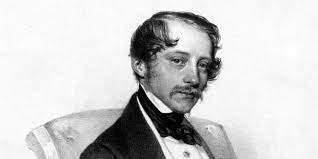Otto Nicolai, a luminary in the realm of 19th-century music, was born on June 9, 1810, in Königsberg, Prussia (now Kaliningrad, Russia). His life’s narrative weaves a tale of artistic fervor, entrepreneurial spirit, and profound musical innovation.
From an early age, Nicolai exhibited an exceptional aptitude for music, mastering various instruments and demonstrating a keen ear for composition. His musical education began under the tutelage of his father, Carl Ernst Daniel Nicolai, a musician and composer himself. Under paternal guidance, Otto delved into the intricacies of harmony, counterpoint, and orchestration, laying the groundwork for his future endeavors.
In pursuit of further musical enlightenment, Nicolai embarked on a journey across Europe, studying in Berlin, Copenhagen, and finally settling in Vienna, where he immersed himself in the vibrant musical culture of the Austrian capital. Vienna, with its rich tradition of opera and symphonic music, proved to be a fertile ground for Nicolai’s artistic development.
Nicolai’s compositional oeuvre encompassed a diverse range of genres, including symphonies, chamber music, and choral works. However, it was in the realm of opera that he truly distinguished himself. His operas, characterized by melodic elegance, dramatic intensity, and a keen sense of theatricality, captivated audiences across Europe.
In 1842, Nicolai achieved a milestone in his career with the premiere of his opera “Die lustigen Weiber von Windsor” (The Merry Wives of Windsor) in Berlin. Based on Shakespeare’s comedy, Nicolai’s adaptation became an instant sensation, earning him widespread acclaim and securing his reputation as one of the leading operatic composers of his time.
Beyond his prowess as a composer, Nicolai also demonstrated remarkable entrepreneurial acumen. In 1847, he founded the Vienna Philharmonic Orchestra, laying the groundwork for one of the world’s most revered musical institutions. His vision and leadership not only elevated the standards of orchestral performance in Vienna but also paved the way for the orchestra’s enduring legacy.
Tragically, Nicolai’s life was cut short at the age of 38, leaving behind a legacy that continues to resonate through the annals of music history. His contributions to the operatic repertoire, his innovative approach to orchestral performance, and his unwavering dedication to musical excellence ensure that Otto Nicolai remains a revered figure in the pantheon of classical music, his melodies echoing through the corridors of time.


Comments are closed